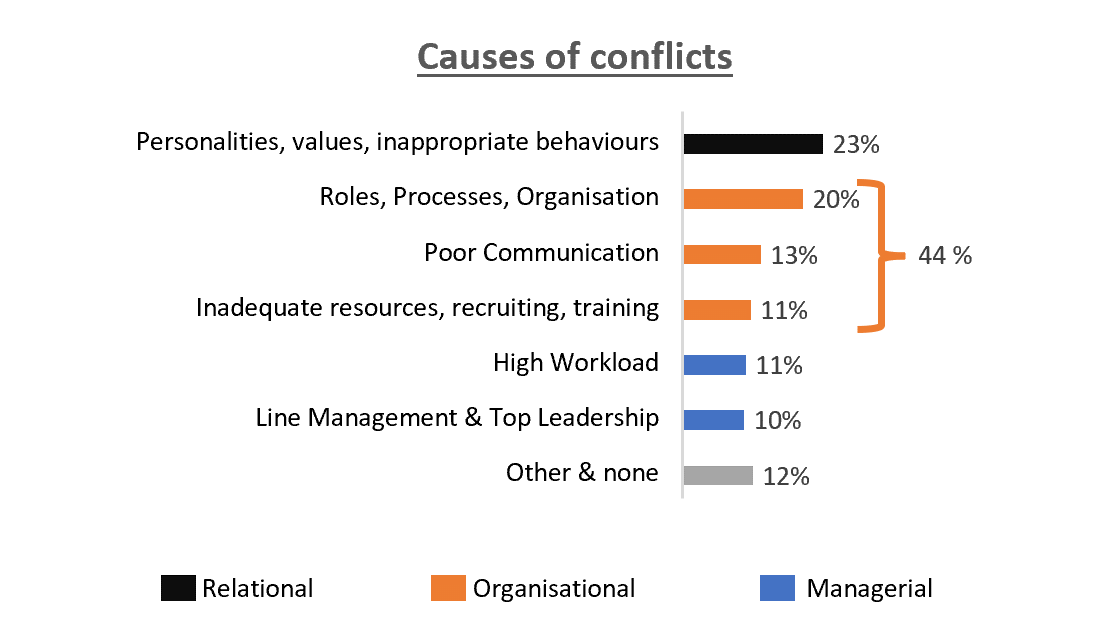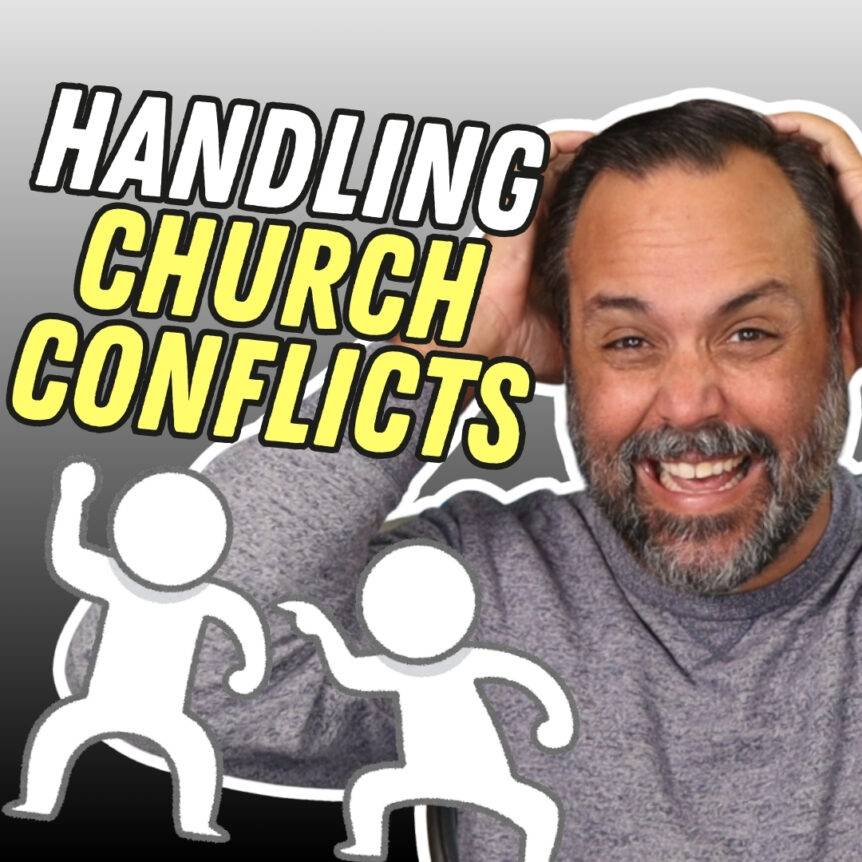If you’ve worked in ministry for any amount of time, you know that interpersonal conflict is inevitable.
Church conflicts are more common than many people think. Whether it’s disagreements over leadership, different views on church direction, or personal misunderstandings, conflicts can quickly create tension. This can lead to hurt feelings, division, and a drop in church unity.
But it doesn’t have to stay that way. When handled well, conflicts can actually bring growth, understanding, and stronger bonds within the church. This podcast will share simple but powerful ways to face these challenges.
You’ll learn why conflicts happen, how to handle them with empathy and clear communication, and how to find peaceful resolutions rooted in faith. By addressing conflicts head-on, your church can move from division to harmony, creating a community that’s stronger and more united than before.
Let’s dive in.
Estimated reading time: 9 minutes
Table of contents
Understanding Church Conflicts

First up, its important for us to understand conflict within ministry. It could be between people on staff, church members, or even with people outside of the church. It could only involve two people, two families, or even huge groups.
What causes conflict? What does it do to your church? Let’s find out.
Types of Church Conflicts
Church conflicts can come in many forms. Common types include disagreements over church direction or teachings, leadership struggles, and personal clashes between members. Sometimes, even small issues can grow into big problems if not addressed.
When church leaders have different visions or members feel their voices aren’t heard, tensions can rise. Recognizing the type of conflict is the first step to finding a solution.
These stats from Welvago are on the most common types of workplace conflict.

Though your ministry may not always be considered a “workplace”, these stats are still indicative to human behavior and relationship, and so probably still hold partially true for conflict within church staffs.
From this, we can see that “personal” conflict is the most common, while different types of organizational issues cause the second most amount of conflict in workplaces.
Why Conflicts Arise
Conflicts often happen because people have different expectations or priorities. A church leader might focus on expanding ministry, while others may prioritize community outreach. Sometimes, members or leaders act in their own interests without thinking of the bigger picture.
Miscommunication or a lack of transparency can make things worse, creating frustration and misunderstandings. Knowing why conflicts start helps when resolving conflict.
The Impact on the Church
Unresolved conflicts can harm the church. They can lead to a drop in attendance, weakened trust in church leaders, and even the splitting of church groups.
People may feel hurt or become disconnected, which hurts the unity of the church. This makes it important to act quickly to resolve conflict before it spreads and damages relationships.
Biblical Principles
Using biblical principles is key in resolving conflict. The Bible teaches about forgiveness, humility, and understanding others. Verses like Matthew 18:15-17 guide us on how to talk to those who have wronged us, encouraging direct communication and peaceful solutions.
When church leaders and members turn to these teachings, they create a foundation for resolving issues with love and respect. This approach helps the church not only solve problems but also grow stronger together.
Understanding these aspects is the first step to building a more peaceful, unified church community.
Key Principles

Now that we understand what might start conflict, what can we do to resolve it? Before we get into the 4 steps you can take to bring peace and unity into situations, its important for us to cover key principles to keep in mind when doing so.
Listening and Communication
One of the most important principles for conflict resolution is active listening. This means paying close attention to what others are saying without interrupting or judging. When church family members feel heard, tensions often ease.
In a church meeting, faith leaders should encourage everyone to share their thoughts and listen carefully to all sides. Clear communication helps avoid misunderstandings that can lead to bigger problems.
Empathy and Understanding
Resolving conflicts is much easier when people show empathy and try to understand each other’s feelings. Church divisions often grow when people feel misunderstood or dismissed.
Taking the time to see things from someone else’s point of view can make a big difference. Faith leaders should model this behavior, showing that understanding and compassion are key to unity.
Using Biblical Principles
Applying biblical principles is essential for resolving conflicts. The Bible provides teachings on forgiveness, patience, and humility that should guide the process. This reminds everyone involved that the goal is not to “win” but to bring peace and healing to the church family. Here are some key verses to consider:
- Matthew 18:15-17: Teaches about addressing conflicts directly and seeking reconciliation.
- Ephesians 4:32: Encourages kindness, compassion, and forgiving one another as God has forgiven us.
- Proverbs 15:1: Reminds us that a gentle answer can calm anger and prevent escalation.
- James 1:19: Highlights the importance of being quick to listen, slow to speak, and slow to become angry.
- Colossians 3:13: Emphasizes the need for bearing with one another and forgiving grievances.
These scriptures remind the church family that unity and love matter more than holding onto grudges or prioritizing one’s own interests.
Seeking Godly Counsel
Sometimes, conflicts are too difficult to handle alone. It is wise to seek godly counsel from trusted faith leaders or experienced church members who can offer objective advice.
This helps keep discussions focused on finding solutions instead of fueling more disagreement. With godly counsel, church members and leaders can work through tough issues with a balanced, faith-centered approach.
Staying Focused on Unity
The main goal should always be to restore peace and prevent further church divisions. By following these key principles, a church family can overcome challenges and become stronger, growing in love and faith together.
4 Steps to Restoring Peace and Unity

With those principles in mind, its important for us to then start taking steps to actually resolving any conflict that may arise. Here are the 4 steps you can take to start restoring peace and unity to the situation.
Step 1: Identify the Core Issue
The first step in restoring peace and unity is understanding what the real problem is. In a local church, issues can sometimes look like one thing but have deeper roots. Maybe what seems like a disagreement over music is really about feeling unheard or overlooked.
To avoid unnecessary conflict, church leaders should take the time to talk with all parties and find out the real cause. Addressing conflict at its source helps avoid misunderstandings and keeps small issues from growing.
Step 2: Hold Open Discussions
Once the core issue is known, it’s time to bring people together for an honest and respectful conversation. A church meeting led by trusted leaders or mediators can create a safe space for sharing. Everyone involved should have a chance to speak without fear of judgment.
This step is key to preventing what feels like a “civil war” within the church. Open discussions encourage members to understand each other and work toward a shared solution.
Step 3: Seek Solutions and Common Ground
Finding common ground helps build unity. After listening to all sides, work together to come up with solutions that respect everyone’s views. This doesn’t mean everyone gets exactly what they want, but it shows that the local church values all voices.
By focusing on shared goals, like worship, community service, or spiritual growth, members can move past their differences and focus on what matters most.
Step 4: Follow Through with Reconciliation
The final step is ensuring that everyone feels the conflict has truly been resolved. This may mean offering apologies, asking for forgiveness, or agreeing on new guidelines for moving forward.
Addressing conflict in this way shows that the church is committed to peace. With genuine effort and God’s guidance, unity can be restored, making the church stronger than before.
Preventing Further Conflict

So conflict is resolved! Even with the current situation being dealt with, there will always be more problems on the horizon. So what can we do to prevent further conflict?
Let’s find out.
Encourage Open Communication
One of the best ways to prevent further conflict in a local church is to create a culture of open communication. Members should feel safe sharing their thoughts and concerns without fear of judgment.
Regular meetings or discussion groups can help everyone stay connected and prevent misunderstandings from growing into larger issues. When church leaders show they are open to feedback, it builds trust and keeps problems from simmering under the surface.
Equip Leaders with Training
Church leaders play a big role in keeping peace. Providing training in conflict management helps them handle tough situations calmly and fairly.
Leaders who know how to listen, mediate, and guide discussions can prevent small issues from turning into bigger conflicts. Investing in this type of training shows the church’s commitment to unity and healthy relationships.
Focus on Shared Goals
A local church should remind its members of their shared mission, such as worship, serving others, or community outreach. When everyone keeps these common goals in mind, it becomes easier to put aside personal differences.
Focusing on what unites rather than divides helps the church stay strong and prevents unnecessary conflict.
With these practices, the church can foster a harmonious, supportive environment for all.
Church Conflict Resolution

Preventing and resolving conflicts in the church is essential for maintaining a loving, unified community. By promoting open communication, equipping leaders with conflict management skills, and focusing on shared goals, a local church can avoid unnecessary conflict and grow stronger together.
Addressing conflict with empathy, understanding, and biblical guidance creates an atmosphere where members feel valued and heard. Remember, peace and unity don’t come from avoiding problems but from facing them with love and wisdom.
By taking these steps, the church can be a true reflection of God’s love, bringing people closer to one another and their faith.
More Resources on Conflict and Community





